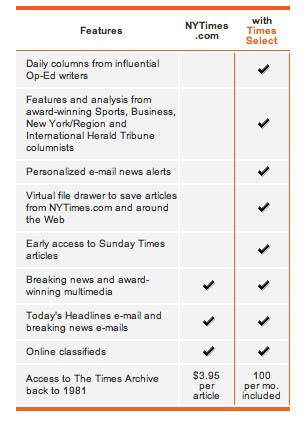You can’t fault the Times for trying to find a new business model for the web, but they seem to be doing themselves more harm than good with Times Select. Jay Rosen has a terrific post on Press Think running through various reactions to the NY Times’ new subscription service that charges $49.99 per year for access to columnists, archives, and exclusive interactive features. Rosen rightly notes that the Times has gotten the idea of exclusivity all wrong:
The phrase “exclusive online accesss” advertises two different goods. The first good is the work of the Times columnists themselves. The proposition that some will pay for that is hard to prove until you try, but it’s simple to understand. The second good being advertised is exclusivity. You, the lucky TimesSelect subscriber, have access to these voices. Others do not. The value proposition there is muddled. If we prize up-to-date information about petroleum markets, we might value it more–and pay a premium–if the news is exclusively available to paying customers; but do we value Nicholas D. Kristof’s column more if he’s an “exclusive?”
We don’t. In fact, it’s probably the reverse. If everyone is reading a columnist, that makes the columnist more of a must have. If “everyone” isn’t, less of a must. “Exclusive online access” attacks the perception of ubiquity that is part and parcel of a great columnist’s power. In his prime Walter Lippmann was called “the name that opened every door.” Nick Kristof’s brand of human rights journalism, which depends on the mobilization of outrage, is simply less potent if it can’t reach widely around the world, and pass by every door.
The Wall Street Journal is an exclusive paper, so offering it over the web as a pay subscription service actually increases its cachet. The Times is a different sort of paper – it has a general audience and is read the world over. Its ubiquity, its availability over the web, is part of its identity.
Moroever, the Times is seriously overvaluing its columnists, or worse, de-valuing them by placing them behind a pay wall. If I were Tierney, or Kristof or Dowd, I would be furious. It makes them look like preened show dogs when everyone else is duking it out in the commons for all to read. Seems like a one-way ticket to irrelevance. Plus, soon they’re going to have to take part in all sorts of online chats and seminars with Select subscribers – I bet they’ll really start to chafe then.
The archive access is certainly tempting, though over-priced. Still, that seems a better starting point for a paperless subscription model, though it’s hard to imagine archives alone finding a mass paying audience.


